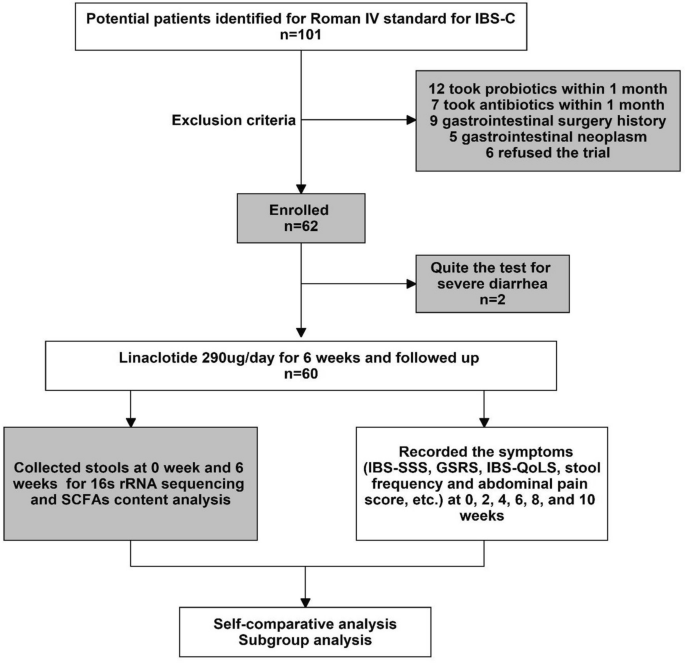💡 This scientific report investigates the influence of linaclotide, a therapeutic agent for Irritable Bowel Syndrome with Constipation (IBS-C), on gut microbiota composition and its correlation with treatment efficacy. The study highlights the association between changes in the gut microbiome, particularly the abundance of 𝘉𝘭𝘢𝘶𝘵𝘪𝘢, and symptom relief in IBS-C patients receiving linaclotide treatment. The findings underscore the potential of the gut microbiota, specifically 𝘉𝘭𝘢𝘶𝘵𝘪𝘢, as a predictive marker for linaclotide efficacy.
📍 Key Scientific Findings:
📌 Linaclotide Efficacy in IBS-C: Linaclotide, administered at a daily dose of 290 µg for six weeks, improved defecation, relieved abdominal symptoms, and modified bowel evacuation habits in IBS-C patients. Approximately 43.3% of patients met the FDA responder endpoint, and 85% reported relief from abdominal pain and constipation, aligning with previous clinical findings.
📌 Individual Differences in Treatment Effectiveness: Despite overall efficacy, individual differences in treatment response were observed, suggesting the multifactorial nature of IBS-C pathophysiology.
📌 Gut Microbiota Alterations: Linaclotide significantly modified the gut microbiome in IBS-C patients, with notable changes in the abundance of 𝘉𝘭𝘢𝘶𝘵𝘪𝘢 𝘢𝘯𝘥 𝘍𝘶𝘴𝘪𝘤𝘢𝘵𝘦𝘯𝘪𝘣𝘢𝘤𝘵𝘦𝘳. IBS-C patients exhibited lower baseline abundance of 𝘉𝘭𝘢𝘶𝘵𝘪𝘢 compared to healthy volunteers.
📌 Association with 𝘉𝘭𝘢𝘶𝘵𝘪𝘢 Abundance: Higher efficacy of linaclotide was associated with the enrichment of the 𝘉𝘭𝘢𝘶𝘵𝘪𝘢 genus, and its abundance post-treatment exceeded that in healthy volunteers. Positive correlations were found between improvements in clinical symptoms, the abundance of 𝘉𝘭𝘢𝘶𝘵𝘪𝘢, and concentrations of short-chain fatty acids (SCFAs).
📌 SCFA Metabolism: Linaclotide treatment influenced SCFA metabolism, contributing to its therapeutic effects. Positive correlations were established among symptom improvement, 𝘉𝘭𝘢𝘶𝘵𝘪𝘢 abundance, and SCFA concentration. The study emphasizes the role of SCFAs in stool viscosity and their connection to IBS-C symptoms.
📌 Clinical Implications: 𝘉𝘭𝘢𝘶𝘵𝘪𝘢, as a commensal anaerobic bacterium, may contribute to maintaining intestinal environmental balance, preventing inflammation, and producing SCFAs. The study suggests that the therapeutic effect of linaclotide may involve increasing SCFA concentrations through modulation of the gut microbiota, particularly by enhancing 𝘉𝘭𝘢𝘶𝘵𝘪𝘢 abundance.
📌 The study acknowledges limitations, including the absence of a randomized, controlled, double-blind clinical design and a relatively small sample size. Gender-based differences in IBS and the study’s confinement to Chinese patients highlight areas for future research and confirmation of findings in diverse populations.
📍 This study illuminates the intricate relationship between linaclotide, gut microbiota, and treatment efficacy in IBS-C patients. The identification of 𝘉𝘭𝘢𝘶𝘵𝘪𝘢 as a significant predictive microbe for symptom relief opens avenues for further research and potential personalized treatment strategies in IBS-C. The gut microbiota and its metabolites emerge as pivotal contributors to linaclotide’s therapeutic effects, enhancing our understanding of IBS-C pathophysiology.
Link to the article : http://tinyurl.com/mth4erbe
